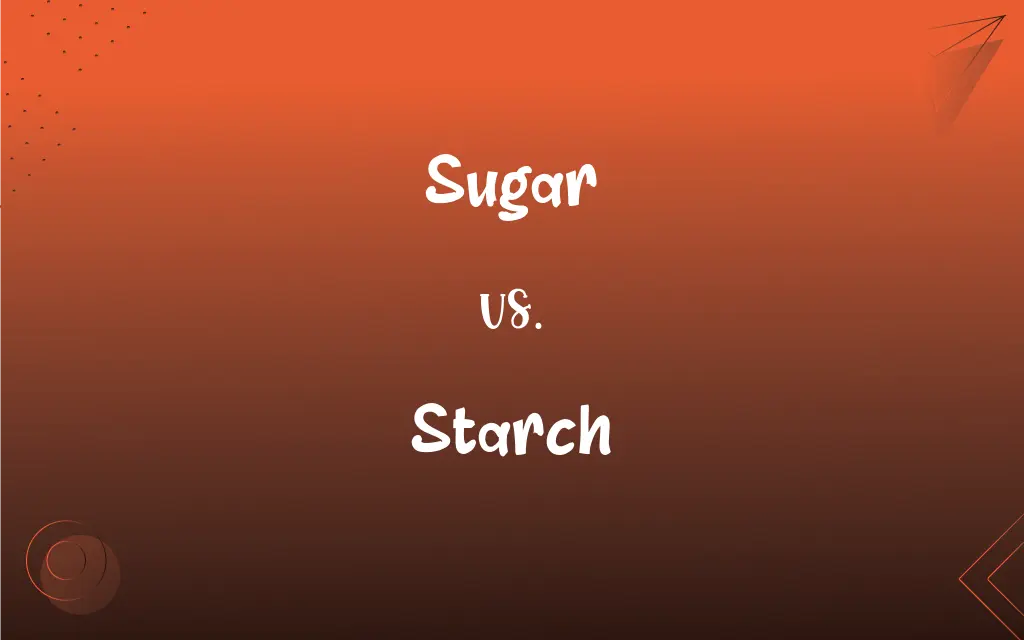Sugar vs. Starch: What's the Difference?
Edited by Harlon Moss || By Janet White || Updated on October 17, 2023
Sugar is a sweet crystalline substance used as a sweetener, while starch is a complex carbohydrate found in grains and tubers.

Key Differences
Sugar and starch are both carbohydrates, but they serve different purposes in our diet and have distinct chemical structures.
Sugars are simpler compounds, often associated with sweet flavors, found in foods like fruits, honey, and sugar canes. Their small molecular structure allows them to be quickly digested, providing a fast source of energy. Starch, on the other hand, is a complex carbohydrate, commonly found in foods like potatoes, rice, and wheat. Being more intricate, it takes longer for our bodies to break down starch, offering a slower, more sustained energy release.
Both sugar and starch play crucial roles in human nutrition, but excessive sugar intake is often linked to health issues, such as diabetes and obesity. Starches, particularly unrefined ones, are typically considered a healthier energy source, providing not just energy but also essential fibers.
Comparison Chart
Type
Simple carbohydrate (monosaccharides or disaccharides).
Complex carbohydrate (polysaccharide).
Digestion Speed
Quickly digested.
Slowly digested.
ADVERTISEMENT
Taste
Sweet.
Generally tasteless or slightly sweet.
Common Sources
Fruits, honey, sugar cane.
Grains, potatoes, legumes.
Health Implications
Excessive intake can lead to health issues.
Provides sustained energy and dietary fiber.
Sugar and Starch Definitions
Sugar
Informal representation for money.
Big corporations have the sugar to fund such ventures.
Starch
Substance used to stiffen fabrics.
She used starch to make the collars crisp.
ADVERTISEMENT
Sugar
A sweet crystalline or powdered substance, white when pure, consisting of sucrose obtained mainly from sugarcane and sugar beets and used in many foods, drinks, and medicines to improve their taste. Also called table sugar.
Starch
A carbohydrate found in many plants, stored for energy.
Potatoes are a good source of starch.
Sugar
Any of a class of water-soluble crystalline carbohydrates, including sucrose and lactose, having a characteristically sweet taste and classified as monosaccharides, disaccharides, and trisaccharides.
Starch
The quality of being stiff and formal.
His manner had a certain starch to it.
Sugar
A unit, such as a lump or cube, in which sugar is dispensed or taken.
Starch
A naturally abundant nutrient carbohydrate, (C6H10O5)n, found chiefly in the seeds, fruits, tubers, roots, and stem pith of plants, notably in corn, potatoes, wheat, and rice, and varying widely in appearance according to source but commonly prepared as a white amorphous tasteless powder.
Sugar
(Slang) Sweetheart. Used as a term of endearment.
Starch
Any of various substances, such as natural starch, used to stiffen cloth, as in laundering.
Sugar
To coat, cover, or sweeten with sugar.
Starch
Starches Foods having a high content of starch, as rice, breads, and potatoes.
Sugar
To make less distasteful or more appealing.
Starch
Stiff behavior
"Dobbs, the butler ... isn't as stiff as he used to be.
Ann, my brother's new wife, has loosened up his starch a bit" (Jennifer St. Giles).
Sugar
To form sugar.
Starch
Vigor; mettle
"Business travel can take the starch out of the most self-assured corporate titan" (Lisa Faye Kaplan).
Sugar
To form granules; granulate.
Starch
To stiffen with starch.
Sugar
To make sugar or syrup from sugar maple sap. Often used with off.
Starch
(uncountable) A widely diffused vegetable substance, found especially in seeds, bulbs and tubers, as extracted (e.g. from potatoes, corn, rice, etc.) in the form of a white, glistening, granular or powdery substance, without taste or smell, and giving a very peculiar creaking sound when rubbed between the fingers. It is used as a food, in the production of commercial grape sugar, for stiffening linen in laundries, in making paste, etc.
Sugar
(uncountable) Sucrose in the form of small crystals, obtained from sugar cane or sugar beet and used to sweeten food and drink.
Starch
Carbohydrates, as with grain and potato based foods.
Sugar
(countable) A specific variety of sugar.
Starch
(uncountable) A stiff, formal manner; formality.
Sugar
Any of various small carbohydrates that are used by organisms to store energy.
Starch
(uncountable) Fortitude.
Sugar
(countable) A small serving of this substance (typically about one teaspoon), used to sweeten a drink.
He usually has his coffee white with one sugar.
Starch
(countable) Any of various starch-like substances used as a laundry stiffener
Sugar
(countable) A term of endearment.
I'll be with you in a moment, sugar.
Starch
To apply or treat with laundry starch, to create a hard, smooth surface.
She starched her blouses.
Sugar
A kiss.
Starch
Stiff; precise; rigid.
Sugar
Effeminacy in a male, often implying homosexuality.
I think John has a little bit of sugar in him.
Starch
Stiff; precise; rigid.
Sugar
Diabetes.
Starch
A widely diffused vegetable substance found especially in seeds, bulbs, and tubers, and extracted (as from potatoes, corn, rice, etc.) as a white, glistening, granular or powdery substance, without taste or smell, and giving a very peculiar creaking sound when rubbed between the fingers. It is used as a food, in the production of commercial grape sugar, for stiffening linen in laundries, in making paste, etc.
Sugar
(dated) Anything resembling sugar in taste or appearance, especially in chemistry.
Sugar of lead (lead acetate) is a poisonous white crystalline substance with a sweet taste.
Starch
Fig.: A stiff, formal manner; formality.
Sugar
Compliment or flattery used to disguise or render acceptable something obnoxious; honeyed or soothing words.
Starch
To stiffen with starch.
Sugar
Heroin.
Starch
A complex carbohydrate found chiefly in seeds, fruits, tubers, roots and stem pith of plants, notably in corn, potatoes, wheat, and rice; an important foodstuff and used otherwise especially in adhesives and as fillers and stiffeners for paper and textiles
Sugar
Money.
Starch
Stiffen with starch;
Starch clothes
Sugar
(programming) syntactic sugar.
Starch
A white odorless tasteless granular or powdery complex carbohydrate.
Corn starch is used as a thickening agent in sauces.
Sugar
(transitive) To add sugar to; to sweeten with sugar.
John heavily sugars his coffee.
Starch
A polysaccharide used by plants as energy storage.
Plants convert glucose to starch for future use.
Sugar
(transitive) To make (something unpleasant) seem less so.
She has a gift for sugaring what would otherwise be harsh words.
Sugar
In making maple sugar, to complete the process of boiling down the syrup till it is thick enough to crystallize; to approach or reach the state of granulation; with the preposition off.
Sugar
(entomology) To apply sugar to trees or plants in order to catch moths.
Sugar
To rewrite (source code) using syntactic sugar.
Sugar
(transitive) To compliment (a person).
Sugar
To remove hair using a paste of sugar, water, and lemon juice.
Sugar
(minced oath) Used in place of shit!
Oh, sugar!
Sugar
A sweet white (or brownish yellow) crystalline substance, of a sandy or granular consistency, obtained by crystallizing the evaporated juice of certain plants, as the sugar cane, sorghum, beet root, sugar maple, etc. It is used for seasoning and preserving many kinds of food and drink. Ordinary sugar is essentially sucrose. See the Note below.
Sugar
By extension, anything resembling sugar in taste or appearance; as, sugar of lead (lead acetate), a poisonous white crystalline substance having a sweet taste.
Sugar
Compliment or flattery used to disguise or render acceptable something obnoxious; honeyed or soothing words.
Why, do not or know you, grannam, and that sugar loaf?
Sugar
In making maple sugar, to complete the process of boiling down the sirup till it is thick enough to crystallize; to approach or reach the state of granulation; - with the preposition off.
Sugar
To impregnate, season, cover, or sprinkle with sugar; to mix sugar with.
Sugar
To cover with soft words; to disguise by flattery; to compliment; to sweeten; as, to sugar reproof.
With devotion's visageAnd pious action we do sugar o'erThe devil himself.
Sugar
A white crystalline carbohydrate used as a sweetener and preservative
Sugar
An essential structural component of living cells and source of energy for animals; includes simple sugars with small molecules as well as macromolecular substances; are classified according to the number of monosaccharide groups they contain
Sugar
Informal terms for money
Sugar
Sweeten with sugar;
Sugar your tea
Sugar
A sweet crystalline substance obtained from plants.
The recipe calls for a cup of sugar.
Sugar
Any of various water-soluble compounds that taste sweet.
Glucose and fructose are types of sugar.
Sugar
A sweetener used in food and drinks.
He added some sugar to his coffee.
Sugar
A term of endearment.
Thank you, sugar, she said with a smile.
FAQs
What foods are high in starch?
Foods like potatoes, rice, and corn are high in starch.
Is sugar always unhealthy?
Not always, but excessive intake can lead to health issues.
Is sugar a quick source of energy?
Yes, sugar provides quick energy due to its simple structure.
Can starch be converted into sugar?
Yes, our bodies break down starch into sugar for energy.
Are whole grains a source of starch?
Yes, whole grains like wheat and barley are rich in starch.
Are sugar and starch both carbohydrates?
Yes, both sugar and starch are carbohydrates.
Does starch taste sweet?
Starch generally has a neutral or slightly sweet taste.
Is there a difference in digesting sugar and starch?
Yes, sugar is digested quickly, while starch takes longer to digest.
Why is fiber associated with starch?
Many starchy foods, especially whole grains, also contain dietary fiber.
What is the main source of sugar in our diet?
Processed foods, fruits, and sugary drinks are main dietary sources.
About Author
Written by
Janet WhiteJanet White has been an esteemed writer and blogger for Difference Wiki. Holding a Master's degree in Science and Medical Journalism from the prestigious Boston University, she has consistently demonstrated her expertise and passion for her field. When she's not immersed in her work, Janet relishes her time exercising, delving into a good book, and cherishing moments with friends and family.
Edited by
Harlon MossHarlon is a seasoned quality moderator and accomplished content writer for Difference Wiki. An alumnus of the prestigious University of California, he earned his degree in Computer Science. Leveraging his academic background, Harlon brings a meticulous and informed perspective to his work, ensuring content accuracy and excellence.






































































